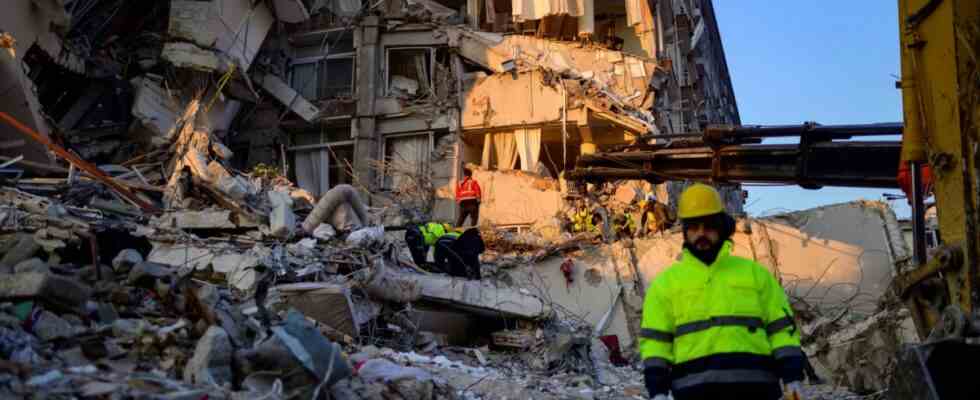This week, the Turks had to get used to images that are impossible to get used to. In the city of Kahramanmaraş, they are now burying the dead in a field, in hastily dug ditches, it looks like after a massacre. There is a photo of a father not letting go of his daughter’s hand, whose body is still under the rubble. A drone is broadcasting footage from Hatay that looks like the city has been at war for years.
How many deaths will there be in the end? A comparison with the earthquake in Sichuan, China in 2008 circulated on Twitter on Friday: Four days later, the death toll there was similar to that in Turkey and Syria, where there are currently more than 21,000. In Sichuan, the number ended up being more than four times as many.
So what is still to come for the people in the disaster region? The number of deaths has recently increased by leaps and bounds, doubling approximately every day. Relatives are still standing in front of the rubble heaps of their houses and know that the buried victims hardly have a chance. And meanwhile the survivors themselves are struggling with the fact that there is no water coming out of the tap, that they cannot find any food. In Syria, the situation is similar – only worse, because there is hardly any help from abroad. The situation there is now so dramatic that people are no longer getting enough food.
The Turkish President has described the disaster as a “plan of fate”. Recep Tayyip Erdoğan has ruled Turkey for a very long time, so long that one can compare how he reacted to other earthquakes. In 2003, for example, when he had just become prime minister, the earth shook in Bingol province. Erdoğan promised consequences, he wanted to see who had enriched themselves during construction. And he said the quake “can’t be dismissed as fate.”
Erdoğan has given Turkey a new face
That’s what the “new Turkey” sounded like, which Erdoğan still talks about today. In addition to their human tragedy, the earthquakes are also an attack on this new Turkey. On the self-image of a society that saw itself on the way to modernity during the Erdoğan years. Things, that was Erdoğan’s promise, should now run differently, more correctly. At first he might have said: more European.
Erdoğan has given Turkey a new face. Yes, indeed: This country looks very different today than it did two decades ago. The President has shaped Turkey, with countless new high-rise residential buildings, for the construction of which he created his own authority, with motorways, bridges, clinics and airports in the easternmost corner of Anatolia. Today, Turkey builds drones and electric cars and has a say in the big geopolitical issues. For the republic’s 100th birthday this year, it should catch up with the ten largest economies in the world, that was Erdoğan’s goal.
There is no more talk of that. And it is precisely the buildings from the Erdoğan era that have been damaged or completely destroyed by the earthquakes. Apparently they just looked modern, they weren’t earthquake-proof. There, in the earthquake area, where many Erdoğan are still connected, something is coming to an end these days: the belief that one could quickly build into modernity.
The helpers on site complain that the apparatus is overwhelmed
It is in these provinces that people suffer most from hyperinflation because of their poverty. Inflation robs them of much of the prosperity they achieved under Erdoğan. Inflation, too, reminds Turks of the 1990s. So: earlier. It’s just like the past is spitting out all over again. Ancient Turkey.
The helpers on site complain that the apparatus is overwhelmed. The levels of leadership, for which people were often chosen more for political allegiance than for competence – who chose them? Opposition politician Meral Akşener said this week: “Mr. Erdoğan wanted a one-man regime,” and now he is “solely responsible.”
Recep Tayyip Erdoğan doesn’t appear to be taking matters into his own hands. Just like in the attempted coup in 2016, when Erdoğan landed in Istanbul that night and drove to the city, an intrepid leader. After that, he really got the country under control. He was the state. Today his people are in shock, again, like after the putsch. Like then, there is a before and an after, Turkey is no longer the same after the earthquake. What does that mean for Erdoğan?
A Turkish journalist wrote this week that he was tired of all these questions: can the president still win? Are the elections even going to plan? Will Erdoğan leave voluntarily if he is voted out? He only wanted to say one thing, the man wrote, very clearly: it was Erdoğan “who got us into this situation.”

